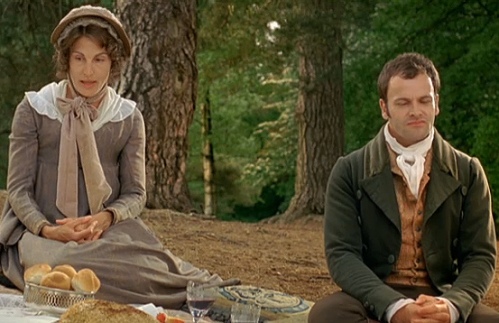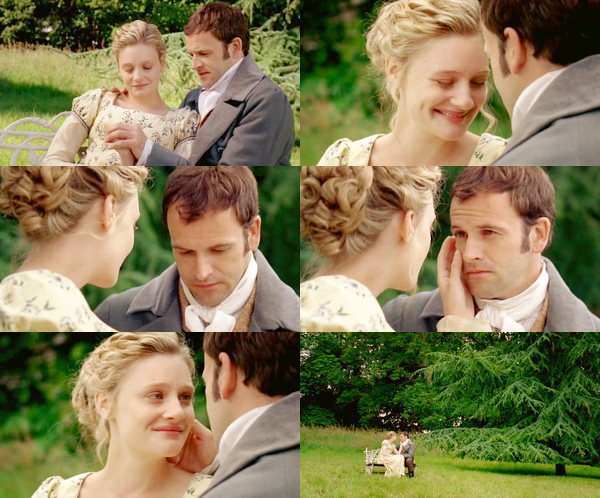The works of Jane Austen have been sacred to femalekind prior to the A&E adaptation of Pride & Prejudice. It is not my favorite, frankly (wildly ducking the hail of tomatoes)—I'm drawn more to Persuasion—and Emma never was a top contender.
Austen herself said Emma is "a heroine whom no one but myself will much like." I always found her meddling and cluelessness to be frustrating. But there were two articles regarding Emma, however, that made me consider it in a new light.
"Jane Austen's Guide to Alzheimer's" by Carol J. Adams humbled me. She explains that Emma's querulous, demanding father is not a humorous caricature, but rather an accurate depiction of a man suffering from mental decline. Adams, her mother stricken by Alzheimer's and so her caregiver, found in Emma a priceless guide.

Emma is remembered mostly as a middling matchmaker harboring prejudices, nearly destroying her friend's chances at happiness. But that is not all she is. Like Adams, she is caretaker to a parent, a role all the more burdensome and heartbreaking given her youth.
In Emma’s case, rather than arguing with Mr. Woodhouse, she redirects him. It is as though she had read the books. With Emma’s help, I could give more and not feel I was losing myself in caregiving, because she was always there, in my mind.
Emma demonstrates one of the casualties of caregiving: When you lose your cool, it might not be with your care receiver, but some unlikely individual in the wrong place at the wrong time. In an important scene that occurs toward the end of the novel, Emma is extremely rude to a downwardly mobile spinster.
That scene did not endear me to Emma. But with the perspective that due to stress, as opposed to spoiling, she snapped a cruel comment in an attempt to divest . . . it is more understandable, and forgivable.

The second was Bookends: "What Do Jane Austen’s Novels Have to Tell Us About Love and Life Today?" Adam Kirsch writes that Austen's books are not universally loved (especially not by "serious" authors) because they accept rather than object to society's conventions. (Which is true; in P&P, when Lydia runs off with Wickham, Elizabeth does not blame Darcy for leaving. She understands that, despite her innocence, she will be tainted by association. And that is that, until Darcy fights for her by paying off Wickham into doing the honorable thing.)
But still within the framework of convention, all ends (improbably) well:
The idea that social life is just — on the marriage market and elsewhere — is the greatest fiction in Jane Austen, and the one that makes her happy endings possible. But it is also the key to her wonderfully intimate imagination of happiness. Few books make the reader as happy as “Emma,” because few depict so well the joy of being understood, the way Mr. Knightley understands Emma Woodhouse. For all of Austen’s heroines, it is this sense of being truly seen, of marrying a man who loves them as they really are, that is the great reward. The institution of marriage, like the novel itself, has changed greatly since Austen’s time; but as long as human beings long for this kind of mutual recognition and understanding, “Emma” will live.
Isn't that just perfect?

Anna Holmes notes that Emma was in a privileged position: comfortable from home, needed at home, and claimed no interest in marrying. She had the luxury to do so, and in turn, she was unconcerned for the regard of men. Nowadays, women are free of the "need" for husbandly support—and so can also be free to be themselves.
In addition to reflecting how women’s economic autonomy creates freedom in other areas of their lives, Emma Woodhouse is a powerful example of a woman who puts herself first, placing a greater value on her needs and desires than on those of many of the men around her. Embedded within Austen’s comedy of manners is the subtle but sustained assertion that women should concentrate less on whether they are worthy of a potential suitor and more on whether a potential suitor is worthy of them.
Esther Wein explains (cannot locate the link, sadly) how in the beginning of creation, man and woman were of equal standing. But the nature of the curses meant that females, weakened by childbirth and whatever else that goes with it, would be reliant upon the physically stronger males.

Yet as we draw closer to the days of Moshiach, the curses will lessen. Women are no longer reliant on men to survive. Therefore, they can have relationships which are based on being "seen" and loved for one's own sake (not their dowries or child-bearing hips). Austen's popularity proves that this was the fantasy of all women—not to fight against society, but to find bliss within it, yearning for marriages based on shared values as opposed to shared land.
The courting game has changed drastically in a short amount of time. And that's all to the good.
I don't know if I agree with all of the articles posted above, but thanks for the recommendation! I hadn't come across this version before and just finished it last night. Even if not on as grand a scale as the 2005 P&P (which is the ultimate, imo), it still has something that version doesn't: it's just plain fun and charming without attempting to be anything else or to try and be a deep commentary on Austen and/or her times.
ReplyDeleteI thought the main actress seemed just a bit too mature looking because isn't Emma supposed to 21 or so? But otherwise, well cast (and to give her credit, RG acted the part well and had great chemistry with all the other actors).
I preferred this "Emma" the best; I found RG (she was 26 when she played Emma, so factoring in the better nutrition of today, I would say that was what 21 looked like two hundred years ago ;)) to be the most likable of all the Emmas, playing her as someone who has little exposure to the outside world and as such, steps into it. When she makes that comment to Miss Bates, she's mindlessly laughing, as opposed to soberly sniping. I adored Johnny Lee Miller as Mr. Knightley, Michael Gambon in general. All hail.
ReplyDelete